Main Gerund Phrase Takeaways:
- Gerunds are nouns created from the verb roots plus –ing.
- For this reason, gerund phrases function as nouns in a sentence.
- A gerund phrase consists of a gerund and any objects or modifiers linked with it.
- Entire gerund phrases act as objects, subjects, or predicate nominatives.
- Verbs ending in –ing are either gerundsorpresent participles.
- A dangling gerundphrase doesn’t have a clear subject. It’s best to avoid this construction because it may confuse your readers.
Gerund sounds like a foreign word, but gerunds are actually a common part of the English language — and so are gerund phrases. In this guide, we’ll show you what a gerund phrase is and how to use it best with plenty of easy examples.
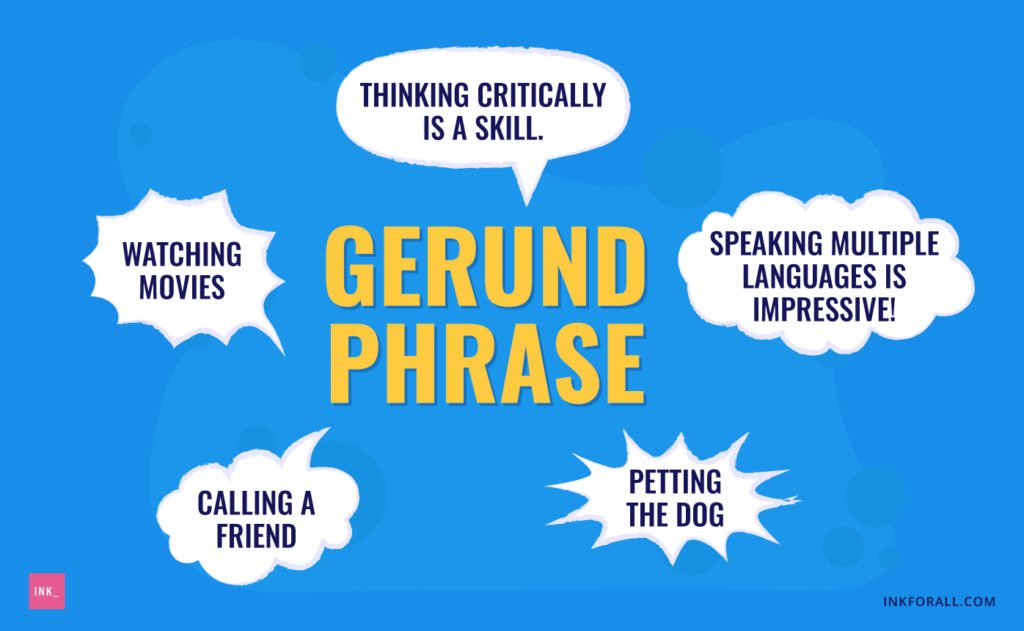

What is a Gerund and Gerund Phrase?
A gerund (pronounced jer-und) is a noun created by adding the ending –ing to a verb (Example: laughing). Similarly, a gerund phrase is a phrase made up of a gerundplus any associated objects or modifiers (Example: Eating an entire pizza…). Even though a gerund is made out of a verb, gerunds and entire gerund phrases actually behave like nouns. In fact, both gerunds and gerund phrases can be objects, subjects, or predicate nominatives.
How Do You Identify a Gerund Phrase?
It’s easy to identify a gerund phrase because this type of phrase always follows these four easy rules:
- Gerund phrases always start with a gerund.
- A gerund phrase has an object, modifier, or both.
- The entire gerund phrase acts as a noun.
- Since it behaves like a noun, the gerund phrase has singular agreement with a verb.
- Does it begin with a gerund?
- Does it have an object or a modifier (or both)?
- Does the entire phrase function as a noun?
- Does the entire phrase have singular agreement with a verb?
Let’s confirm that the bold portion in the above sentence is in fact a gerund phrase:
Does it begin with a gerund?
Yes. The sentence begins with the gerund pouring.
Does it have an object or a modifier (or both)?
Yes. “Too” is a modifier and “batter” is an object.
Does the entire phrase function as a noun?
Yes. The entire phrase “pouring too much batter into your cake tin” functions as an entire unit.
What’s more, it’s the subject of the sentence, making it a noun.
Finally, you can substitute the gerund phrase with the phrase “this thing” and the sentence still makes sense. Because a noun is a thing, you’ve confirmed that the complete gerund phrase is acting as a noun.
What is an Example of a Gerund Phrase?
Here are gerund phrase examples in a sentence:
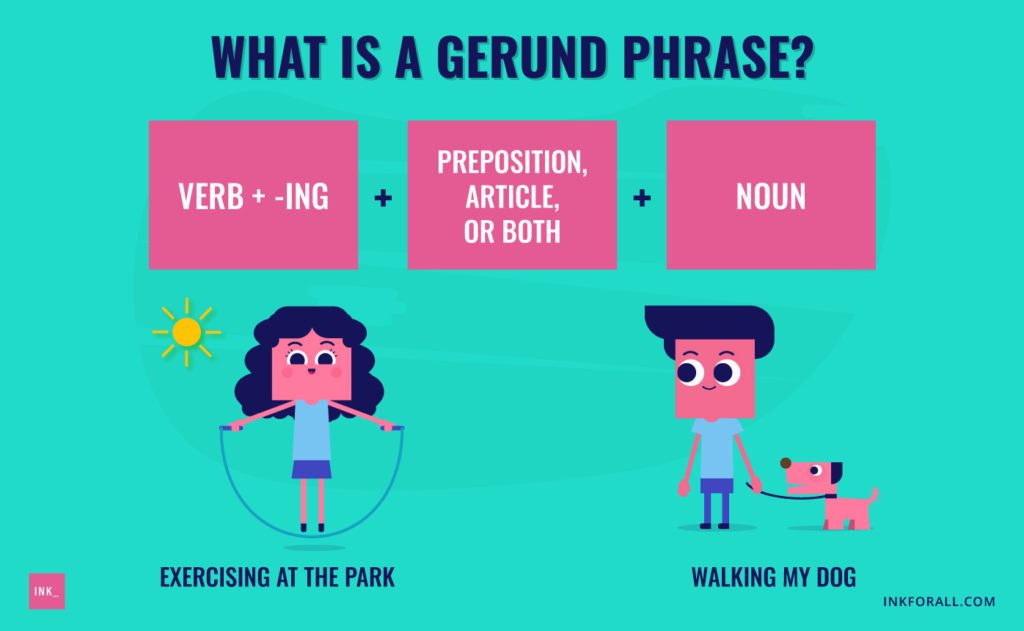

What is a Dangling Gerund Phrase?
Like a dangling modifier, dangling gerund phrases don’t clearly express who the subject of the sentence is. Examples of dangling gerund phrase constructions include “By being kinder to one another, the world can be a better place,” and “The world can be a better place by being kinder to one another.” In both examples, it’s not clear who can make the world a better place. We can correct the dangling gerund phrase by making the subject explicit: By being kinder to one another, we can make the world a better place.
Technical writers tend to use this structure. We recommend avoiding it to make sure you always express yourself as clearly as possible and never risk confusing your readers.
Gerunds are nouns created from a verb plus –ing. Notwithstanding, not all ing words are gerunds. For example, some are present participles. Additionally, gerund phrases include any of the gerund’s associated modifiers or objects.
How is a Gerund Used in a Sentence?
The word gerund comes from the Latingerundus, which means “to carry on.” Simply put, gerunds are actually verbs ending in –ing — but they function as nouns. For example, words like running, jumping, exciting, getting, and telling are all gerunds. Moreover, as nouns, gerunds are objects, subjects, or predicate nominatives (also known as subject complements).
How Do You Tell the Difference Between a Gerund and a Verb?
Generally, a verb is an action word with a tense, like “heating,” while a gerund is a verb word that has been changed to a noun, e.g., “heating up”. As a noun, a gerund can only be modified by an adjective. On the other hand, a verb is modified by an adverb. See examples below:
Since gerunds are nouns, they can’t have direct objects, but they can be the object of a preposition. Meanwhile, verbs can have direct objects.
Are all -ing Verbs Gerunds?
While gerunds are verbal nouns ending in –ing, it’s important to note that not all words ending in –ing are gerunds. For instance, sometimes, –ing words act as a present participle instead. For example, in the sentence “Laughing is a lot of fun,” the word “laughing” acts as a gerund. However, in the sentence “Juliet is laughing at your joke,” the word “laughing” acts as a a present continuous verb.
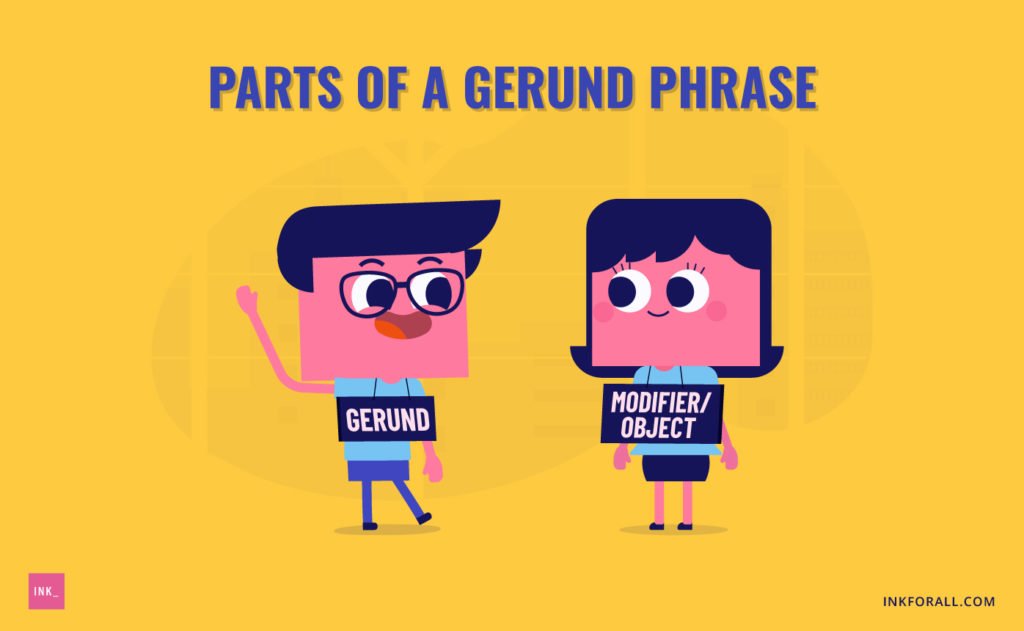

Take our Quick Gerund Phrase Quiz
Gerund Phrase Question #1
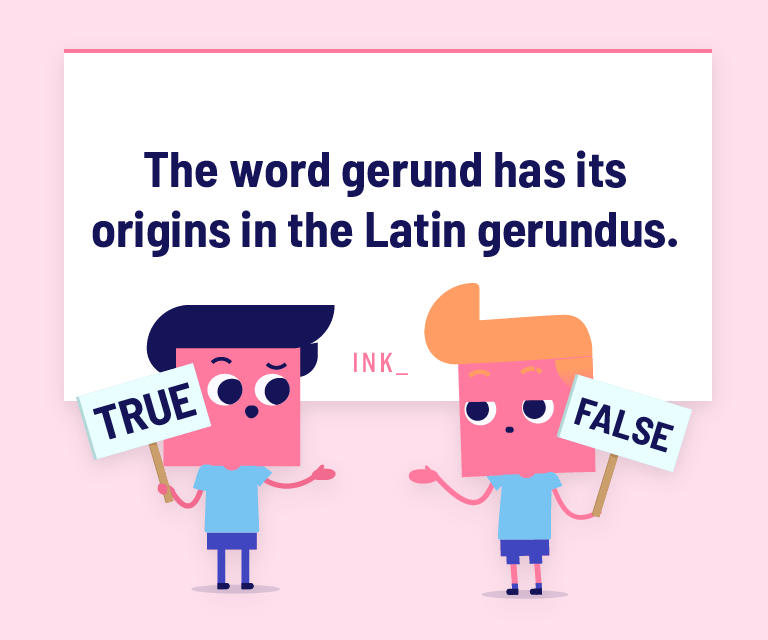

The answer is TRUE. The latin word gerundus means “to carry on.”
Gerund Question #2
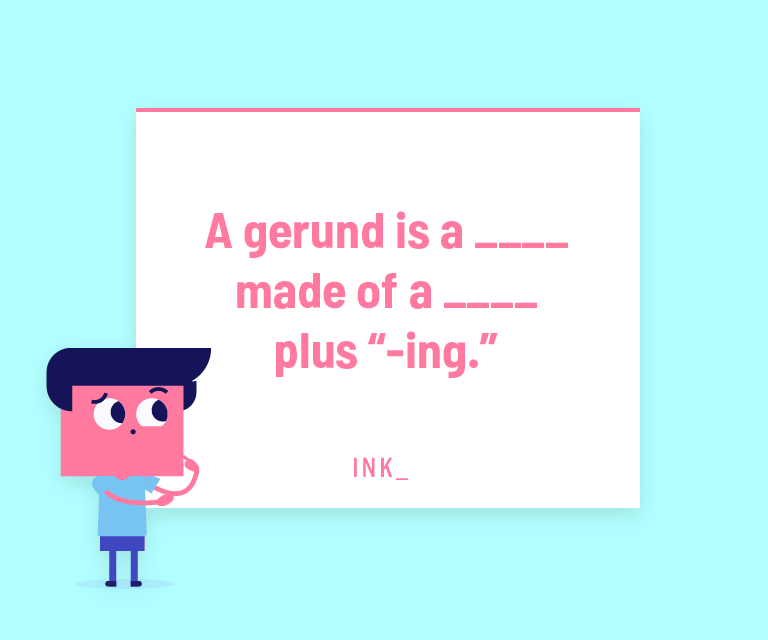

The answer is D. Gerunds are nouns created from verb roots plus -ing.
Gerunds Question #3
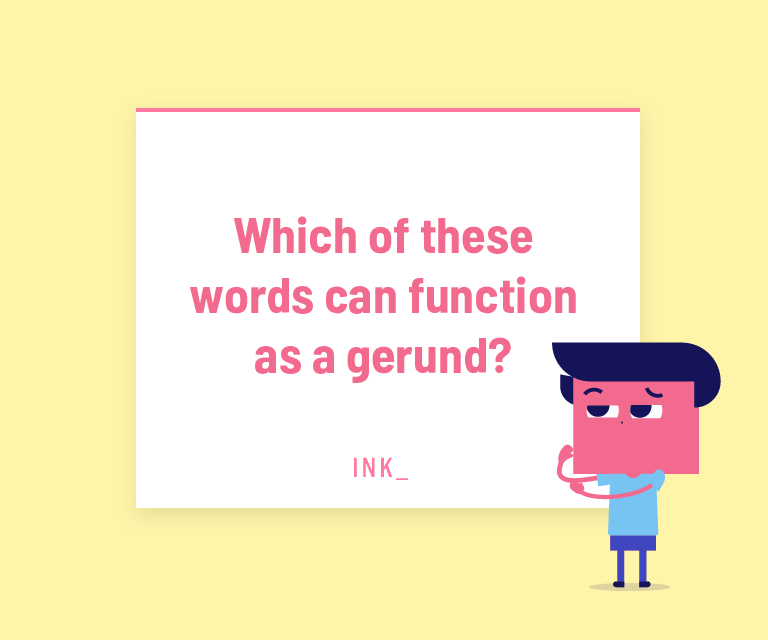

The answer is B. Gerunds are verbs (race) that end in “ing” (racing).
Gerund Phrases Question #4
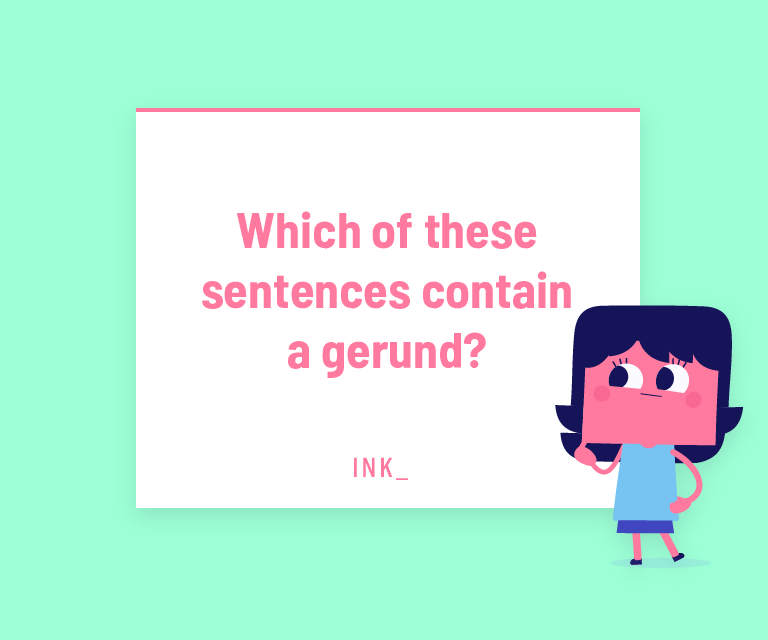

The answer is A. Gerunds function as a noun in a sentence, not present participles.
Gerund Phrase Question #5
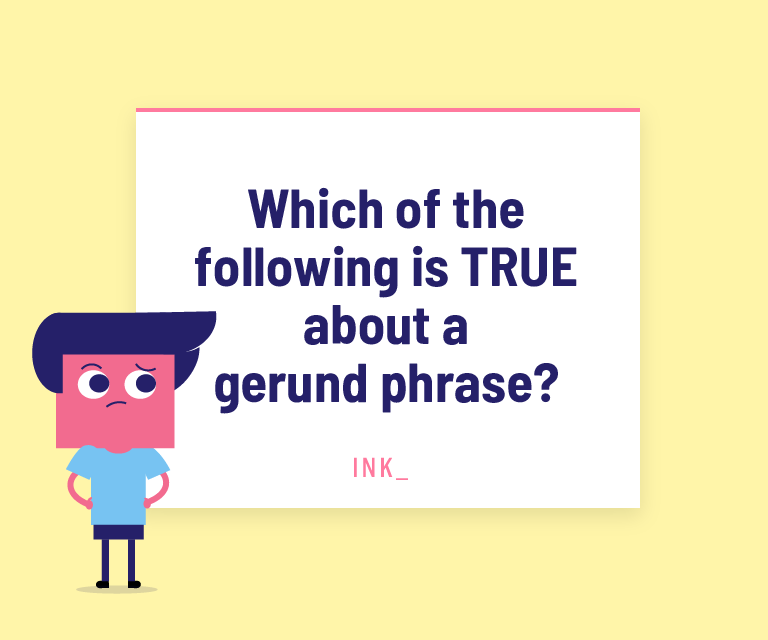

The answer is D. These specific rules make gerund phrases easy to spot.
Gerund Phrase Question #6
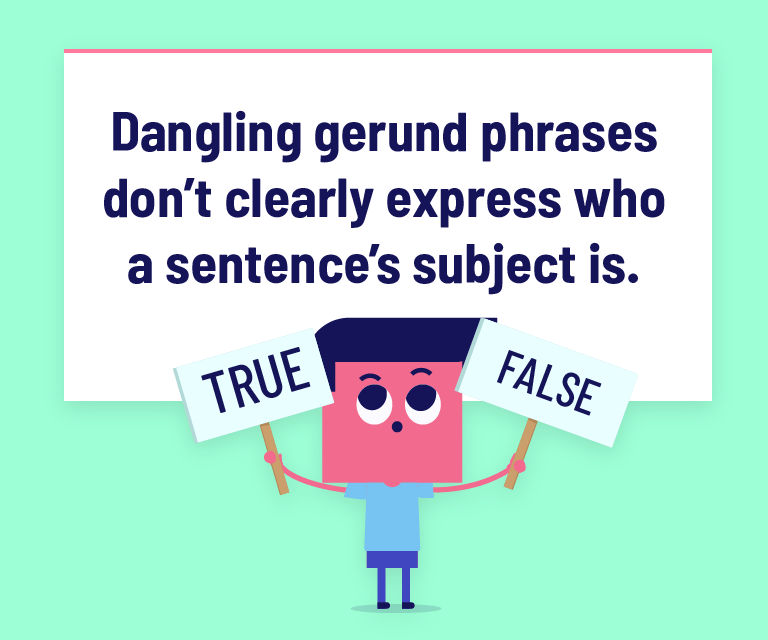

The answer is TRUE. Like dangling modifiers, dangling gerunds can confuse readers.


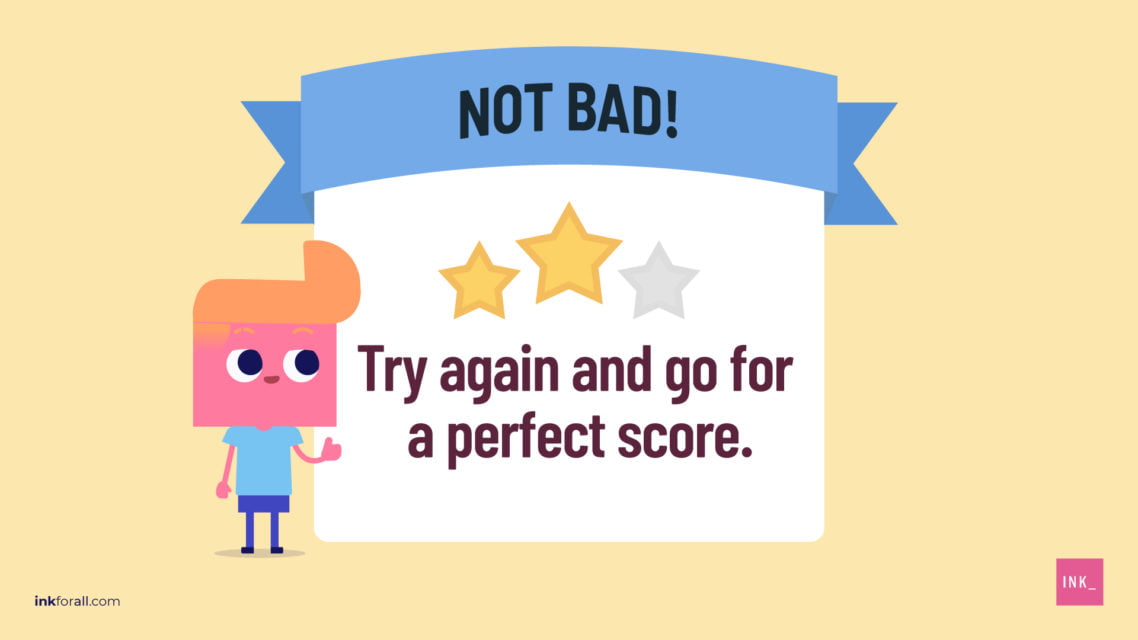

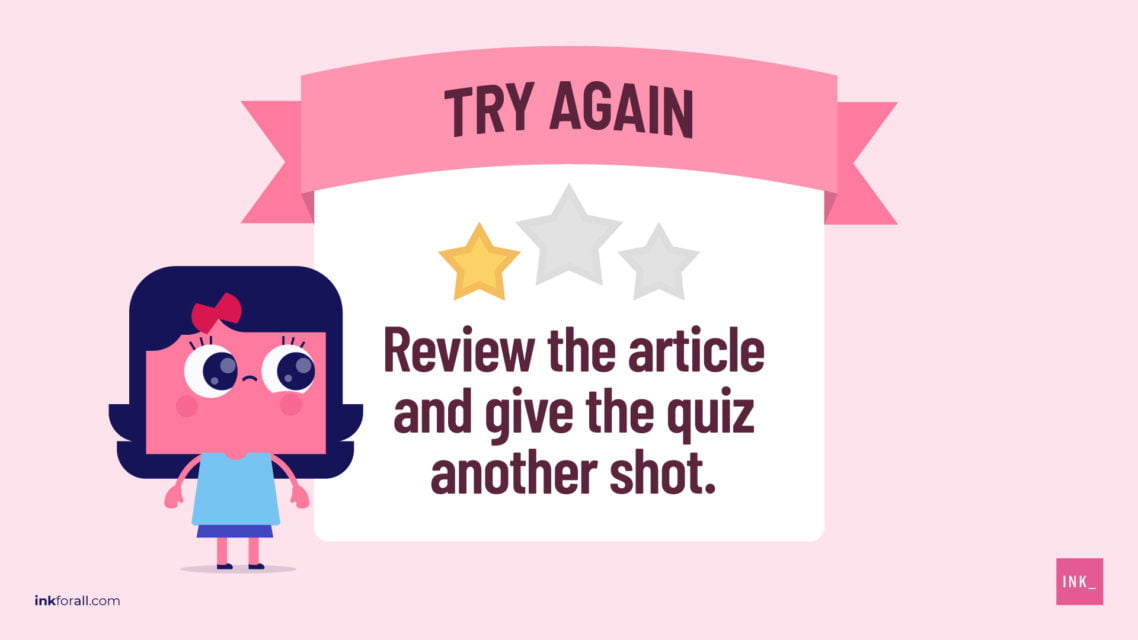


Hello Pam Weber, my name is Jafar Sadiq. I am from India. I love your grammar lessons. Do you provide any online classes?
Thank you for the kind words, Jafar! No, I don’t. Good luck in finding the right classes for you. Thanks for reading our blog and stopping by!